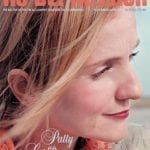The Holmes Brothers – Elementary Grace
“She told them that the only grace they could have was the grace they could imagine. That if they could not see it, they would not have it.”
— Toni Morrison
“We have to learn to play with nothing, with our guitars broken, and it’s raining.”
— Jonathan Richman
These epigrams come from two very different sources — the first from a Pulitzer Prize-winning novelist, the second from a proto-punk/naif-savant — but both express more or less the same ideal. Richman is alluding to the DIY or “do-it-yourself” ethic that defined punk and ’70s new wave, a sensibility that gave way to indie rock. Morrison’s passage, from her novel Beloved, gets at something more explicitly spiritual — at how, as Billie Holiday put it, God blesses the child who’s “got her own.”
In either case, Sherman and Wendell Holmes can relate.
“We used to play a game called Nightclub,” says Sherman, reflecting on the brothers’ childhood in rural Virginia. “You know how kids play Cowboys & Indians? Well we would play Cowboys & Indians and all. But then we would play Nightclub. We’d go outside with nothing but our coats and pretend we were singing and playing music.”
It’s certainly no wonder. There wasn’t much, besides water and woodlands, in Christchurch, Virginia, when the Holmes brothers were growing up there in the 1940s and ’50s. Their parents, both of whom were schoolteachers, didn’t feel obliged to own a TV or a record player, and it was tough to pull in, much less hang onto, a radio signal in the remote, savannah-like expanses of the Tidewater region in which they lived.
The two brothers recall being able to tune in the likes of Jimmy Reed and Hank Williams from time to time — and on Sundays, gospel quartets such as the Soul Stirrers, the Swan Silvertones, and Richmond’s Harmonizing Four. “I remember on Sunday mornings, we’d be with our grandfather,” says Sherman, speaking by phone from his apartment in Brooklyn, New York. “We’d be listening outside; maybe my uncles would be washing a car and the radio would be on. It was good bonding material.”
A pair of the Holmes’ older cousins from Newport News, Rudy and Bernie West, were members of the Five Keys, a doo-wop quintet that recorded for Capitol and is perhaps best known for the 1954 hit “Ling, Ting, Tong”. But beyond that kinship and fickle radio signals, the Holmes brothers really didn’t have much in the way of culture, apart from church and school. Just about everything else was the province of nature — and of their fecund imaginations.
The upshot of it all is that the Holmes Brothers — Sherman on bass and piano, Wendell on guitar, and Popsy Dixon on drums (all three of them sing) — don’t sound like anyone else, even when they’re playing material associated with or written by others. Though rooted deeply in pop, gospel, R&B, country, and rock ‘n’ roll — in virtually every form of the southern musical vernacular — their extemporized harmonies and arrangements are entirely their own and, above all, soulful. It’s perhaps a cliche to say so, but had the term “soul music” not been in circulation when the trio came into their own during the 1970s, someone would have coined it to describe what they do.
“I’m not sure how things end up sounding the way they do; it’s just our flavor,” Sherman says.
“A lot of it has to do with growing up in Virginia,” says Wendell from his home in Baltimore County, Maryland. “But it’s also from being together for so many years. When you find any group that has been together for 30 or 40 years, if they only play ‘Mary Had A Little Lamb’, you can bet that ‘Mary Had A Little Lamb’ is all theirs.”
None of which is to suggest that the Holmes Brothers’ music is sui generis. Preternaturally intuitive, yes, but not without antecedents. Sherman cites Bing Crosby, Junior Parker, Hank Williams and the Carter Family as influences, while Wendell talks of Curtis Mayfield, Jimmy Reed and Taj Mahal.
During the ’60s, Sherman and Wendell also backed Jerry Butler and John Lee Hooker and did formative stints in the bands of Jimmy Jones and Charlie & Inez Foxx, known for their hits “Handy Man” and “Mockingbird”, respectively. And you can hear the electrifying likes of Claude Jeter and Clyde McPhatter in Popsy Dixon’s thrilling falsetto. Like the Holmes brothers, he was born in Virginia; however, he was raised in New York, where the trio came together, made their name — at Dan Lynch’s bar in the East Village — and still is based today.
Roots and influences aside, the Holmes Brothers “never ever copied other people’s styles to the letter,” says Wendell. “I have never tried to copy a lick of anybody’s. I try to bring my own thing to the song based on the chord changes. That’s the key right there, basing it on the structure of the song. That’s why our solos are so different from everyone else’s. I believe that you have to bring your own thing, your uniqueness, to the party.”




